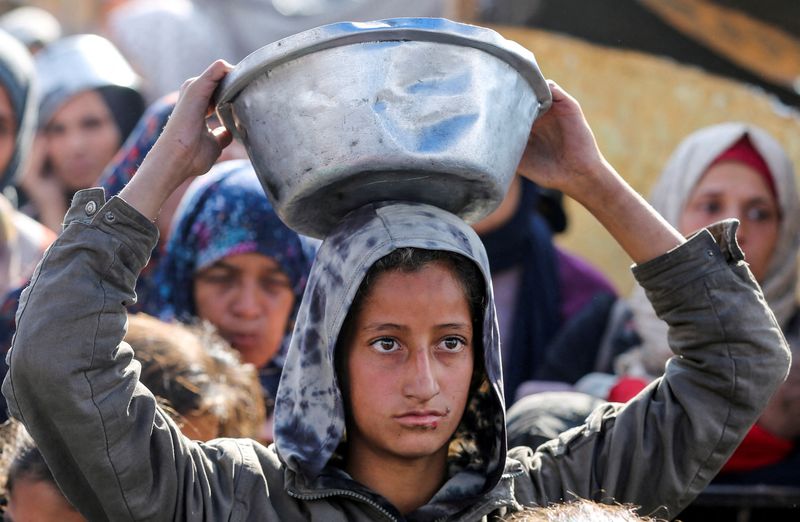Written by Alexander Cornwell and Nidal Al Mughrabi
JERUSALEM/CAIRO (Reuters) – Israel's cabinet has approved an agreement with Palestinian militant group Hamas for a ceasefire in the Gaza Strip and the release of hostages, Prime Minister Benjamin Netanyahu's office said on Saturday, a day before the deal was scheduled to begin. It was announced in advance.
After more than six hours of meetings, the government early Saturday morning ratified an agreement that could pave the way for an end to the 15-month war in the Hamas-controlled Palestinian enclave.
“The government has approved the hostage return framework. The hostage release framework will take effect on Sunday,” Prime Minister Netanyahu's office said in a short statement.
Israeli warplanes have continued to carry out heavy attacks in Gaza since the ceasefire was agreed. Gaza medics said an Israeli airstrike early Saturday killed five people in a tent in the Mawashi area, west of Khan Yunis in the southern enclave.
This brings to 119 the number of Palestinians killed by Israeli shelling since the deal was announced on Wednesday.
After Israeli cabinet approval, U.S. chief negotiator Brett McGurk said the plan was on track.
The ceasefire is scheduled to take effect at 0630 GMT on Sunday, a Qatari Foreign Ministry spokesperson posted on X, adding that the White House expects the three female hostages to be released to Israel in the afternoon through the Red Cross.
“We've locked down every detail of this agreement, and we're very confident…we're ready to implement it on Sunday,” McGuirk told CNN from the White House.
According to the agreement, the three-phase ceasefire will begin with an initial six-week phase, in which hostages held by Hamas will be exchanged for prisoners and detainees imprisoned in Israel.
Of the remaining 98 Israeli hostages, 33 are scheduled to be released at this stage, including women, children, men over 50, and sick and injured prisoners. In return, Israel plans to release about 2,000 Palestinians from prison.
Among them were 737 male, female and teenage prisoners, including members of Palestinian extremist groups convicted of attacks that killed dozens of Israelis and It also includes hundreds of Palestinians from the Gaza Strip who have been detained since its inception.
The Israeli Ministry of Justice released details of the cease-fire agreement early Saturday morning, saying 30 Palestinian prisoners would be released for each female hostage on Sunday.
After Sunday's release of the hostages, the agreement calls for four more female hostages to be released after seven days, and three more every seven days thereafter, McGurk said.
Hardliners oppose ceasefire
The deal is fiercely opposed by some hard-liners in the Israeli cabinet, with media reports saying 24 ministers in Prime Minister Netanyahu's coalition voted in favor of the deal and eight opposed it.
Opponents argued that the ceasefire agreement meant surrender to Hamas. National Security Minister Itamar Ben Gvir threatened to resign if the bill was approved and urged other ministers to vote against it. But he said he had no intention of overthrowing the government.
Fellow hardliner Finance Minister Bezalel Smotrich also threatened to resign from the government if it did not return to the war to defeat Hamas after an initial six-week ceasefire phase.
After a last-minute postponement on Thursday that Israel blamed on Hamas, Israel's Security Cabinet voted in favor of the ceasefire agreement on Friday, a requirement before a full cabinet vote.
Israel launched an attack on Hamas in the Gaza Strip after Hamas fighters stormed into Israel on October 7, 2023, killing about 1,200 people and taking 250 hostages, according to Israeli tallies. .
According to Gaza authorities, the war between Israeli forces and Hamas has destroyed much of heavily urbanized Gaza, killed more than 46,000 people, and destroyed most of the pre-war enclave's 2.3 million people on multiple occasions. I evacuated.
A successful ceasefire could ease fighting in other parts of the Middle East. There, fighting has spread not only to the occupied West Bank but also to Iran and its proxies: Lebanon's Hezbollah, Yemen's Houthis, and Iraqi militants.
Civilians in Gaza are facing a humanitarian crisis due to hunger, cold and disease. The cease-fire agreement calls for a surge in aid, and international organizations have lined up aid trucks at the Gaza border to deliver food, fuel, medicine and other vital supplies.
The Palestinian relief agency UNRWA announced on Friday that it was ready to bring 4,000 truckloads of aid, half of it food, to the coast.

Palestinians waiting for food in the southern Gaza Strip on Friday said they hoped the ceasefire would mean an end to hours-long lines to fill a plate.
“When that happened, I was able to cook at home and eat my favorite foods so that I didn’t have to go to a soup kitchen or spend three or four hours trying to get (food) and sometimes I didn’t have to make it. “I hope that I will be able to create a 'homeland,'” said Reham Sheikh al-Eid, a displaced Palestinian.

